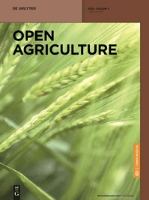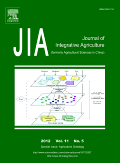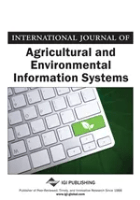
PRECISION AGRICULTURE
Scope & Guideline
Driving innovation in precision farming for a thriving planet.
Introduction
Aims and Scopes
- Remote Sensing and Imaging Techniques:
The journal frequently publishes research on the use of remote sensing technologies, including UAVs, satellite imagery, and multispectral imaging, to monitor and assess crop health, soil conditions, and environmental factors affecting agriculture. - Data-Driven Decision Making:
A core focus is on methodologies that utilize machine learning and data analytics to inform agricultural practices, such as yield prediction, soil management, and nutrient optimization. - Sustainable Agricultural Practices:
Research often emphasizes sustainable practices, including precision nutrient management, irrigation optimization, and the use of technology to reduce environmental impact. - Technological Innovations in Agriculture:
The journal highlights advancements in agricultural technology, including automation, robotics, and IoT applications, which contribute to improved efficiency and productivity in farming. - Crop Management and Yield Optimization:
Papers frequently address methods for optimizing crop management strategies through precision agriculture techniques, focusing on specific crops and regional practices.
Trending and Emerging
- Integration of AI and Machine Learning:
There is a significant increase in research applying AI and machine learning techniques to predictive modeling, crop monitoring, and decision support systems, showcasing the growing importance of these technologies in precision agriculture. - Precision Irrigation Techniques:
Emerging studies focus on optimizing irrigation practices through real-time data collection and analysis, emphasizing water conservation and efficiency in agricultural systems. - Soil Health and Fertility Management:
Research is increasingly addressing soil health through precision techniques, including the use of advanced sensors and remote sensing data to monitor soil conditions and inform management decisions. - Automation and Robotics in Agriculture:
There is a notable trend towards the development and application of robotic systems for tasks such as planting, harvesting, and monitoring, reflecting the industry's push towards automation. - Climate Change Resilience:
Emerging themes include research on adapting precision agriculture practices to enhance resilience against climate change impacts, focusing on sustainable practices and resource management.
Declining or Waning
- Traditional Agricultural Practices:
Research focused on conventional farming methods is becoming less frequent as the emphasis shifts towards precision agriculture techniques that leverage technology and data. - Basic Agronomy without Technological Integration:
Studies that do not incorporate advanced technologies or precision methods are waning, as the field increasingly values innovative approaches that enhance productivity and sustainability. - General Reviews on Precision Agriculture:
While systematic reviews remain valuable, there is a noticeable decrease in papers that provide broad overviews without specific case studies or innovative methodologies, as the journal seeks more focused and application-driven research.
Similar Journals

Open Agriculture
Advancing Agricultural Innovation through Open AccessOpen Agriculture, published by DE GRUYTER POLAND SP Z O O, is an innovative open-access journal dedicated to advancing research in the Agricultural and Biological Sciences. Since its inception in 2016, this journal has been committed to disseminating knowledge and facilitating collaboration among researchers, professionals, and enthusiasts in the agricultural sector. With an impressive Q2 ranking in the Agricultural and Biological Sciences category, it holds a prestigious position, ranking #65 out of 221 in its field, placing it in the 70th percentile. Open Agriculture offers a platform for high-quality research across a diverse range of topics, ensuring that crucial findings are readily accessible to the global scientific community. The journal continues to uphold its mission of promoting sustainable agricultural practices and innovations that address contemporary challenges in food security and environmental sustainability. With its strong commitment to open access principles, researchers and students alike can easily engage with cutting-edge research and contribute to the vibrant discourse surrounding modern agriculture.

Revista Ciencia Agronomica
Empowering innovation in agronomy and beyond.Revista Ciencia Agronomica is a leading open access journal published by the Universidade Federal do Ceará, Departamento de Geociências, dedicated to advancing the field of agricultural sciences. Established in 2008, the journal has emerged as a significant platform for the dissemination of original research and innovative advancements in areas including agronomy, horticulture, and soil science, with a dedicated convergence of years extending to 2025. With an impactful presence in academic circles—ranking in Q3 for Agronomy and Crop Science and Soil Science and Q2 for Horticulture in 2023—this journal provides vital insights for researchers and practitioners alike. Although specific HIndex metrics are currently unavailable, the journal's Scopus rankings attest to its relevance, placing it in the 52nd, 44th, and 43rd percentiles across multiple pertinent categories. Since transitioning to an open access model in 2010, Revista Ciencia Agronomica has committed to maximizing the reach and impact of its published work, thereby ensuring valuable contributions to global agricultural knowledge.

AGROCIENCIA
Driving progress in agronomy and environmental science.AGROCIENCIA, published by COLEGIO POSTGRADUADOS, is a key journal in the fields of agronomy, animal science, and environmental science in Mexico. With an ISSN of 1405-3195 and an E-ISSN of 2521-9766, this journal has been a crucial platform for disseminating research findings since its inception in 2000. Operating from Montecillo, Estado Mexico, it provides an outlet for scholars and practitioners to share innovations and insights that directly impact agricultural practices and environmental sustainability. Despite its current categorization in the Q4 quartile across multiple disciplines, AGROCIENCIA strives to elevate the quality and reach of research, fostering a collaborative approach to tackle pressing issues within the agricultural sciences. Access options are primarily through institutional subscriptions, allowing for a diverse audience of researchers, professionals, and students to engage with the latest studies aimed at advancing knowledge in the agricultural sector. As the journal converges towards its 2024 milestone, it remains dedicated to enhancing scientific inquiry and promoting effective solutions within its discipline.

Agronomy-Basel
Transforming Agricultural Science with Impactful DiscoveriesAgronomy-Basel is a leading international journal dedicated to advancing the field of agronomy and crop science, published by the respected MDPI. Since its inception in 2011, this open-access journal has provided a vital platform for the dissemination of high-quality research, featuring innovative studies and reviews that contribute to the understanding of agricultural practices and crop management. With an impressive impact factor and ranked in the Q1 quartile of its category for 2023, Agronomy-Basel has established itself as a premier resource in the realm of Agricultural and Biological Sciences, achieving a commendable rank of #62 out of 406 in its field, placing it in the 84th percentile. The journal targets researchers, professionals, and students who are dedicated to enhancing agricultural sustainability and productivity. Located in Basel, Switzerland, the journal's commitment to open access empowers global accessibility to flourishing agricultural advancements, thus fostering collaboration and innovation across the globe.

JOURNAL OF AGRICULTURAL AND RESOURCE ECONOMICS
Elevating discourse in agriculture and resource management.Journal of Agricultural and Resource Economics is a pivotal platform in the realm of agricultural and resource economics, published by the Western Agricultural Economics Association. Since its inception, the journal has embraced an Open Access model, fostering widespread dissemination of research findings to benefit both scholars and practitioners in the field. The journal operates within an impressive global ranking framework, resting in Q2 across several pertinent categories including Agronomy and Crop Science, Animal Science and Zoology, and Economics and Econometrics. With its ISSN 1068-5502 and E-ISSN 2327-8285, it has garnered attention for its rigorous academic standards and impactful contributions to the discourse on resource management and agricultural practices. Researchers, professionals, and students alike will find the journal's ongoing commitment to advancing knowledge invaluable, with publications that span from 1996 to 2024 capturing evolving trends and insights in the sector.

Transactions of the ASABE
Exploring the intersection of biology and engineering.Transactions of the ASABE is a premier journal published by the American Society of Agricultural and Biological Engineers, specializing in innovative research and practical applications in the fields of agricultural and biological engineering. With an ISSN of 2151-0032 and E-ISSN 2151-0040, this journal has established a vital niche in disseminating high-quality scholarly content that addresses the complex challenges faced in agriculture and biological systems. The journal operates under an open access model, facilitating broad dissemination of research findings to a global audience. This commitment to accessibility is reflected in its coverage of diverse topics, including agriculture, soil science, food science, and environmental engineering. Although the journal's coverage in Scopus was discontinued in 2021, it once ranked among the top in its categories, indicating its significant contribution to advancing knowledge in these essential fields. Researchers, practitioners, and students are encouraged to engage with the Transactions of the ASABE to stay abreast of developments and foster collaboration in promoting sustainable engineering solutions.

Journal of Integrative Agriculture
Fostering Collaboration for Agricultural ExcellenceJournal of Integrative Agriculture, published by Elsevier Science Ltd, stands as a leading platform for innovative research at the intersection of agricultural sciences. With a significant focus on integrative approaches, this journal has established itself within the academic community, reflecting its excellence through impressive Impact Factor rankings and a consistent Q1 category status in multiple fields, including Agronomy, Animal Science, and Ecology. The journal spans a wide range of topics, making it a critical resource for exploring advancements in Biochemistry, Food Science, and Plant Science. With its diverse Scopus rankings—from Rank #3 in Food Animals to Rank #14 in Animal Science—it serves as a vital repository for cutting-edge research that influences both scientific inquiry and practical applications in the agricultural domain. Operating from China and accessible through open access options, the Journal of Integrative Agriculture aims to foster collaborative research and knowledge exchange among scientists, professionals, and students worldwide, supporting the growth and sustainability of agricultural practices.

International Journal of Agricultural and Environmental Information Systems
Unlocking Information for Sustainable Agricultural PracticesInternational Journal of Agricultural and Environmental Information Systems, published by IGI Global, is a leading platform for scholarly discourse bridging the domains of agriculture, environmental science, and information systems. With its ISSN 1947-3192 and E-ISSN 1947-3206, this esteemed journal has been pivotal in tackling key information challenges within these crucial fields since its inception in 2010, and it continues to evolve until 2024. Featuring articles ranked in the Q3 category for Information Systems based on Scopus metrics— where it proudly stands at Rank #105 out of 394—this journal occupies a significant position in advancing knowledge dissemination and applied research. The open access option broadens the reach of its valuable content, making it accessible to a diverse audience. The journal's objective is to foster interdisciplinary research and innovations that enhance sustainability in agricultural practices and environmental management. By subscribing to the latest studies and innovations, researchers, professionals, and students can leverage the insights published in the International Journal of Agricultural and Environmental Information Systems to significantly contribute to their fields and foster better decision-making in environmental stewardship and agricultural advancements.

Journal of Agricultural Machinery
Enhancing Productivity Through Research in Agricultural EngineeringJournal of Agricultural Machinery, published by FERDOWSI UNIVERSITY MASHHAD PRESS, is a premier Open Access journal that has been serving the agricultural engineering community since 2011. This journal is dedicated to disseminating cutting-edge research, innovative practices, and technological advancements related to agricultural machinery. With an ISSN of 2228-6829 and an E-ISSN of 2423-3943, it provides a vital platform for researchers and professionals in the field to share their findings and insights. The journal, based in Iran at the Ferdowsi University of Mashhad, aims to bridge gaps between research and application, enhancing productivity in agriculture through improved machinery and methodologies. Despite its current Scopus ranking at the lower end of the spectrum, the journal is committed to elevating its impact and expanding its scope, focusing on innovative solutions that address pressing challenges in agricultural practices. As an Open Access resource, it ensures unrestricted availability to scholarly articles, fostering a collaborative environment for growth and learning among researchers, professionals, and students alike.

International Journal of Plant Production
Advancing sustainable agriculture through innovative research.International Journal of Plant Production, published by SPRINGER in Switzerland, serves as a leading platform for the dissemination of innovative research in the fields of Agronomy, Crop Science, and Plant Science. With an ISSN of 1735-6814 and an E-ISSN of 1735-8043, this journal has maintained its reputation by achieving a Q2 quartile ranking in both categories as of 2023, alongside notable Scopus rankings placing it in the top quartiles of its fields (Rank #105/516 and Rank #88/406, respectively). The journal's scope encompasses a wide array of topics vital to sustainable agriculture and plant production systems, making it a critical resource for researchers, professionals, and students striving for advancements in these disciplines. By fostering open scientific dialogue and supporting cutting-edge research, the International Journal of Plant Production is committed to contributing to the resolution of global food security challenges, enhancing agricultural practices, and promoting ecological sustainability.